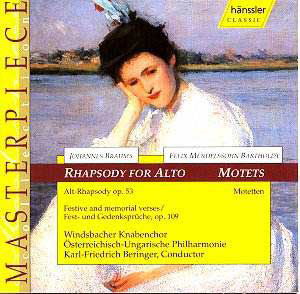This disc is a reissue of 1996 performances which made
more headway on the continental mainland than in the UK. The repertoire
is interesting and finds each of these great composers at the height
of his powers. Yet only one of the works featured here - the Alto Rhapsody
of Brahms - is at all well known.
So far so good, and a warm welcome. But before the
accolades carry us away, there are two distinct disadvantages. First
there is Hänssler's ill-conceived policy of not issuing texts,
translations or background notes with their budget-priced issues. Instead
they offer a time-consuming 'free download' of the booklet 'in several
languages', but of course in an A4 format which is therefore difficult
to store. Just as obvious a drawback is the playing time of less than
38 minutes. It seems scarcely possible these days that a major company
can so readily shoot itself in the foot. Who except the most die-hard
collector is going to buy a CD containing only half as much music as
it might?
Having made these observations, which I am afraid do
register uppermost in my mind, on to the performances. They are rather
good. Lioba Brawn is a rich toned soloist in the Alto Rhapsody, which
is atmospherically paced by the conductor, Karl-Friedrich Beringer.
The recording is very lively, with plenty of atmosphere but an indulgent
closeness which makes everything seem larger than life.
The Festive and Memorial Verses represent a further
example of the large repertoire Brahms created for mixed voices. We
should not forget that his attraction to Vienna involved his awareness
of the choral tradition in the city, in particular the Singverein. However,
this particular composition of his later years harks back in many ways
to the city of his youth: Hamburg. In May 1889 the city fathers there
acknowledged Brahms's achievement with the award of honorary citizenship,
and his creative response with appropriate dedication was this composition
for unaccompanied voices, the Festive and Memorial Verses.
The music has real gravitas, and a telling sense of
occasion. Brahms wrote wonderfully well for ensemble voices, and these
performers do justice to his vision. The recorded sound is atmospheric
too; it is just a pity that accessing the text is so difficult, and
downright impossible for anyone without the Internet.
The more one knows of Mendelssohn, the higher one's
opinion of his music. Like Brahms he spent much time and effort on choral
music, both as composer and conductor. These three motets for various
unaccompanied choral groupings are particularly well written and have
abundant textural subtleties. The performances are carefully prepared
and appropriately responsive, and the recording has a pleasing ambience
and balance.
Terry Barfoot


